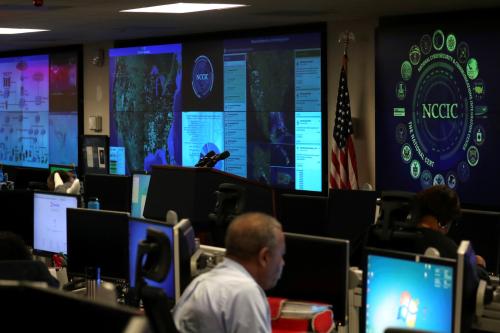In the debate over North Korea policy, Democrats have avoided raising the human rights issue, conceding it to President Bush and the evangelical wing of the Republican Party.
This approach may seem to make sense on narrow military grounds because it is principally North Korea’s nuclear weapons that threaten us and therefore natural to focus on them in policy debates. But it is a serious mistake.
There are three major problems with the Democrats’ reluctance to demand improvements in North Korea’s human rights conditions as a necessary prerequisite to any substantial détente between the two countries.
First, in U.S. political terms, it is helping turn Korean-Americans increasingly to the Republican Party, making them one of only two major Asian-American groups (along with Vietnamese) to favor the GOP.
There are 2 million Korean-Americans in the United States, with a substantial number successful economically, active politically and highly educated. More than 70 percent are Christian, and the majority can trace family roots to North Korea. For them, the issue of human rights in North Korea is an emotional issue just as the Soviet Jewry movement of the 1970s was for American Jews. In the last year, Korean-Americans have been politicized as never before.
There are more than 70 college chapters of LINK (Liberation in North Korea) across the country, and the Korean Christian community recently held a rally attended by more than 2,000 pastors. These efforts were largely responsible for the passage of the North Korean Human Rights Act last year. If Democrats appear indifferent to the well-being of helpless North Korean citizens, political prisoners and refugees in China, the Korean-American tilt toward the GOP will likely increase.
Second, in moral terms, the Democrats’ stance seems inconsistent for a party that has championed human rights around the world for decades. North Korea’s nuclear arsenal should not prevent Democrats from speaking out. Nuclear weapons in the Soviet Union did not, after all, prevent concerted attention to its horrible human rights practices during the Cold War.
Third, even in strategic terms, the Democrats’ silence on human rights is increasingly hard to justify. North Korea’s nuclear weapons do represent that country’s greatest threat to the United States. But it makes little sense to try to do a deal for them alone; that approach has not worked for either of the last two administrations. Nor is it clear why we could ever trust a country that systematically brutalized its own people.
Any plan to denuclearize North Korea will have to be based on a broader logic and a different one from the purely hard-line approach the Bush administration is following. Rather than buy out North Korea’s nukes, we should offer to help that country reform more comprehensively, as Vietnam and China have done in recent decades even while retaining communist governments.
This type of strategy would require not only North Korean denuclearization but also economic reform and conventional military cuts. And it would require a human rights dimension.
To get Japanese aid, North Korea would have to account for the Japanese kidnapped over the last few decades. And if we are to place Japanese human rights on the table, what about the millions of North Korean innocents living in harsh and repressive conditions under Kim Jong Il, the huge numbers who have died of starvation during the Kim regime, the hundreds of thousands in the prison camps today and the tens of thousands who have fled to China in search of food?
It may be unrealistic to expect the immediate release of the prisoners. But at a minimum, the Red Cross would need to be allowed to visit North Korean prisons, monitor conditions and suggest reforms. And the world community would need to serve North Korea notice that human rights will now be part of the ongoing dialogue with Pyongyang.
This approach plays to classic Democratic foreign policy strengths. It fits well within a new North Korea strategy that would be more compelling than the alternatives Democrats are pushing, such as focusing on bilateral talks and only the nuclear program. It also offers political advantages at home—appealing to a major Asian-American constituency and reminding voters in general that Republicans are not the only ones favoring strong values in American foreign policy.
The Brookings Institution is committed to quality, independence, and impact.
We are supported by a diverse array of funders. In line with our values and policies, each Brookings publication represents the sole views of its author(s).



Commentary
Op-edWrong on North Korea
July 13, 2005